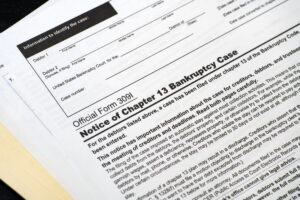
I recently had the experience of helping a client who was incarcerated when we filed his case, and I thought I would share some of the issues that we had to deal with. Hopefully, this will help anyone who is facing the same situation trying to get their financial affairs in order while they serve time in jail.
The first thing you should know is that filing bankruptcy while you are in jail is not easy. It requires a fair amount of planning.
It’s possible to file bankruptcy if you give someone a power of attorney over your financial affairs in certain situations or if you have guardianship over someone. In this particular case, my client had not designated a power of attorney and was not in a guardianship.
Originally, my client’s plan had been to file his bankruptcy before he was sentenced. However, a death in his family delayed his filing. My client was sentenced the same day he signed his petition, but before we could file it.
At that point, we had to figure out how to proceed. Everyone who files bankruptcy must attend the 341 Meeting of Creditors, required by the Bankruptcy Code. 341 refers to the section in the Code. My client would not be allowed to attend this meeting in person, so we had to arrange for him to appear by phone. There are a couple of hurdles to this happening. First, my client had to get permission from the criminal justice system to appear by phone. While my client filed a motion in state court for him to appear, in retrospect, that didn’t appear necessary. After talking to staff at the detention center, they arranged to make my client available.
Second, the trustee who convenes the 341 hearing had to agree to my client appearing by phone. This is usually a fairly simple thing to negotiate, except in this case there wasn’t anyone available to administer an oath to my client prior to the hearing asking him to swear that everything he said during the meeting would be the truth. After conferring with the United States Trustee about a solution, the UST agreed to allow me to verify my client’s government issued identification and social security number.
When the hearing date arrived, I went to the jail where I was allowed to meet with my client to accept a phone call from the trustee for the 341 hearing. The meeting went off without a hitch. I have to say that the trustee in this case went above and beyond the call of duty to accommodate my client.
The final step in the bankruptcy process for most people is completing a financial management class. Most people take this class online. My client was able to take it over the phone.
While we were able to navigate the bankruptcy process, I’m not sure I would be very enthusiastic about helping another client in his situation. There are a fair amount of obstacles present, and the process would be much easier either before or after a person enters jail.
If you have any questions about whether bankruptcy might be a good option for you, we hope you’ll give us a call at 303.331.3403. We offer free consultations for people who are considering bankruptcy. You can also schedule a free consultation by clicking here.


